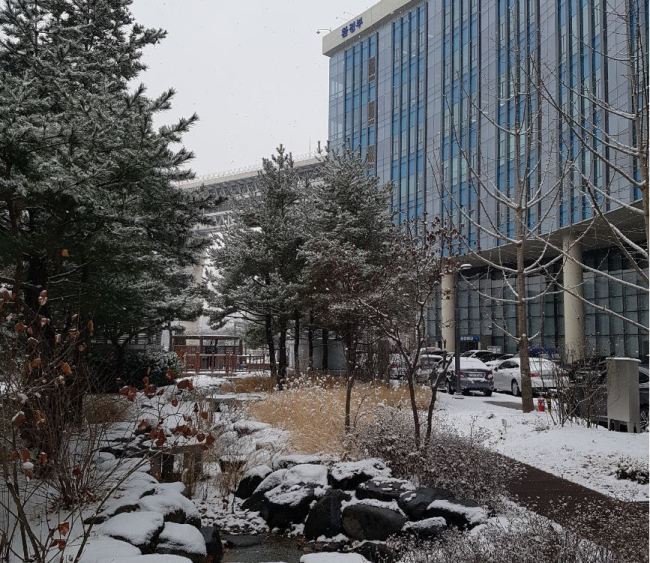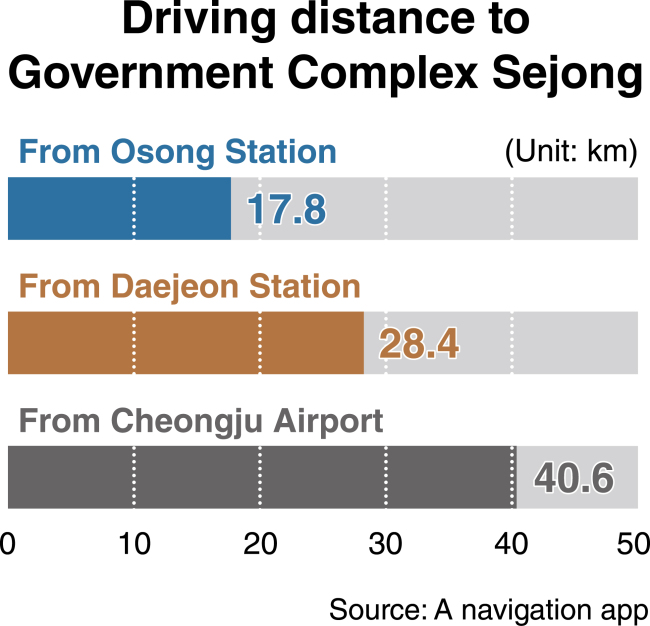[News Focus] Will ‘KTX Sejong Station’ be built amid backlash from Cheongju?
By Kim Yon-sePublished : Jan. 31, 2019 - 18:02
SEJONG - Those headed for the Government Complex Sejong by the KTX high-speed train across the country should now spend another 20 to 30 minutes by taxi or bus from Osong Station in Cheongju, North Chungcheong Province.
Further, it will take about 50 minutes to an hour for those using flights to reach the complex via public transportation from Cheongju International Airport.
Many visitors as well as civil servants raise the necessity to resolve the inefficiency, calling for the government to establish a KTX station around the complex in Sejong Autonomous City as soon as possible.
Their request has still faced backlash from regional officials in North Chungcheong Province, who claim the government should continue the principle toward balanced development of both the South Chungcheong and North Chungcheong provinces.
The administrative-oriented Sejong was created by combining parts of Gongju and Yeongi-gun in South Chungcheong and Cheongwon-gun in North Chungcheong Province in July 2012.
Further, it will take about 50 minutes to an hour for those using flights to reach the complex via public transportation from Cheongju International Airport.
Many visitors as well as civil servants raise the necessity to resolve the inefficiency, calling for the government to establish a KTX station around the complex in Sejong Autonomous City as soon as possible.
Their request has still faced backlash from regional officials in North Chungcheong Province, who claim the government should continue the principle toward balanced development of both the South Chungcheong and North Chungcheong provinces.
The administrative-oriented Sejong was created by combining parts of Gongju and Yeongi-gun in South Chungcheong and Cheongwon-gun in North Chungcheong Province in July 2012.

Nonetheless, Sejong Mayor Lee Choon-hee has expressed his policy direction to set up Sejong Station. Lee said the city “is making efforts in a variety of aspects to fine-tune different views and interests among regions.”
He cited several factors for the necessity of a KTX station -- relocation of two more ministries from Seoul and Gwacheon, Gyeonggi Province, to Sejong, slated for this year, and project to establish a unit of the National Assembly in the city and demand for bullet train use among residents in Daejeon, which is located just south of Sejong.
In line with his remarks, more than 2,000 civil servants from the two ministries will relocate in September. “Considering moves of their families, the demand for efficient transportation system is growing,” said a senior official in the complex.
Lee issued the possibility that the central government could eventually change its stance from its current negative stance to a positive stance toward the station establishment, adding the preliminary feasibility research is underway.
Sejong is pushing forth setting up the station in Yongpo-ri or Balsan-ri, Geumnam-myeon, which is just south of the Geum River and government complex, as early as 2025. It takes about five minutes by bus between the cited districts and complex.
Its plan is part of a policy road map unveiled by Mayor Lee in 2018, who suggested 145 pledges in which about 9.3 trillion won ($8.3 billion) is required during his four-year term.
According to the city, the budget for Sejong Station is estimated at 100 billion to 130 billion won, and it could play a role as a flag stop between the Osong and Gongju KTX stations.

A visitor via Cheongju International Airport complained about the long distance to the complex. “I’ve seen a group of foreigners on the bus take an hour to the complex. KTX convenience should be improved as early as possible to overcome one of the dual inefficiencies in flight and KTX connection transportation.”
To the contrary, a retail business owner in Cheongju pointed out the underdeveloped situation in Osong-eup, Cheongju. “Osong Station is lonely, located in darkness every evening. Measures to vitalize the commercial district around Osong should precede the project to build a Sejong KTX station,” he said.
A Yeonseo-myeon resident compared the contrasting situation in the number of consumers visiting large discount chains in Eojin-dong around the complex (a far higher number of people) and Jochiwon-eup, though they have the same brands in Sejong.
Sejong, in addition, is moving to introduce a metro network to link northwest Daejeon and Seochang-ri, Jochiwon-eup in the coming years, which will be a 28.5-kilometer operation course.
The subway construction project is worth 800 billion won, composed of a government budget of 560 billion won and city budget of 240 billion won. The city is initially conducting preliminary feasibility research on the 9.7-kilometer course between Sejong Intercity Bus Terminal and Banseok Station in Daejeon.
By Kim Yon-se (kys@heraldcorp.com)
















![[KH Explains] Hyundai's full hybrid edge to pay off amid slow transition to pure EVs](http://res.heraldm.com/phpwas/restmb_idxmake.php?idx=652&simg=/content/image/2024/04/18/20240418050645_0.jpg&u=20240418181020)

![[Today’s K-pop] Zico drops snippet of collaboration with Jennie](http://res.heraldm.com/phpwas/restmb_idxmake.php?idx=642&simg=/content/image/2024/04/18/20240418050702_0.jpg&u=)